Argentina lifts restrictions on dollar purchases
Government does U-turn on monetary policy in place since the end of 2011


Beginning on Monday Argentineans will again be able to buy dollars without restrictions on the official market, something that has been a nearly impossible endeavor since late 2011 due to government-imposed restrictions.
The measure was announced early Wednesday morning by Cabinet Chief Jorge Capitanich, who was flanked by Economy Minister Axel Kicillof. It came a day after the peso experienced its greatest depreciation in the last 12 years, closing at 7.75 pesos to the dollar on the official market, where the banks operate, and 13 pesos to the dollar on the black market for currencies.
In a surprise move, the government also decided to reduce the fee that people pay to buy dollars for foreign travel or purchases, down from 35 to 20 percent.
The government also decided to reduce the fee that people pay to buy dollars for foreign travel or purchases
Every morning at 8am, Capitanich holds a press conference in which he takes questions. But this time, as he announced the most important measure since he took up his post, he merely read out a statement that lasted 90 seconds, and declined to answer any questions.
"We have come here precisely to communicate that we have decided to authorize the purchase of dollars by persons, based on their declared income. At the same time, we have decided to reduce the anticipated tax on earnings from 35 to 20 percent for the buyer. [...] The government considers that the price of the currency, that is to say the dollar, has reached a level of convergence that is acceptable for the goals of economic policy."
Faced with a flurry of questions from the media, Axel Kicillof took the microphone just as he was leaving and said: "Look, the same people who told us for 10 years [a reference to the 1990s and the administration of Carlos Menem] that the dollar was worth one peso are the people who are now trying to convince us that it is worth 13 pesos. So you draw your own conclusions."
Kicillof was referring to the price reached the day before by the dollar on the black market, which small investors turn to when they want to buy foreign currency. The government has repeatedly suggested that the convulsions in the currency market are caused by the speculative interests of a reduced group of capitalists.










































